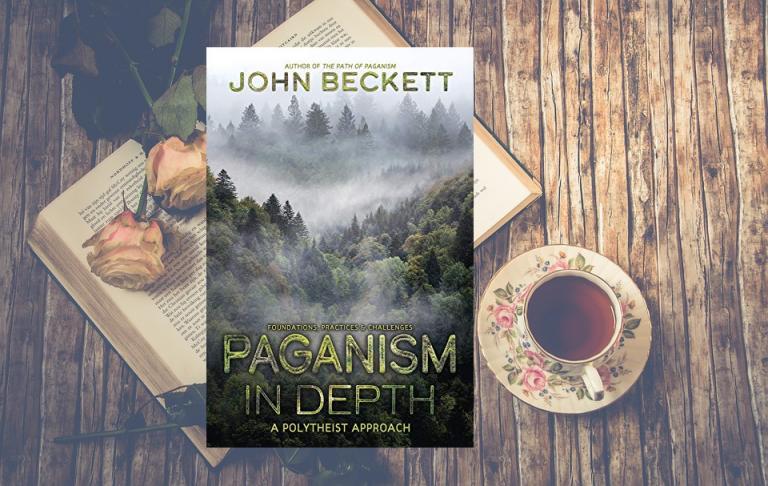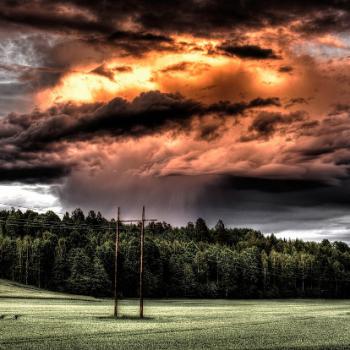
John Beckett and I have a few things in common. We are both polytheists, for one thing. He is a member of ADF (Ár nDraíocht Féin) and that is where I myself started out in my formal group practice in polytheistic paganism. We each serve in a priesthood capacity within our own communities, although his role in that may differ somewhat from mine. We also both blog here at Patheos and share a number of philosophical viewpoints. Heck, we even both started out with Scott Cunningham’s Earth Power as our first magical text.
Naturally I’m quite pleased to have the opportunity to review his latest book, Paganism In Depth: A Polytheistic Approach.
When I first started out into the world of paganism, there wasn’t much out there that could be considered “advanced” reading. Much of it was for beginners, and I had to stumble and fall on my own with very few genuine role models if any. ADF helped me out a great deal when I was in college, and I’m forever grateful for that. It served to provide a foundation for my practice and a great deal of grounding in academic research coupled with the personal and mystical. Not everyone has access to such groups, and that’s where books need to fill in those gaps.
This book helps those who want to go deeper with their practice, but don’t know where to start. It breaks down different theological and philosophical concepts. These are concepts included in most if not all of pagan faiths including different styles and approaches to paganism. They include devotional, magical, polytheistic, oracular, ancestral, and ecstatic approaches to worship and what each of them means.
There’s a lot of ground to cover in this book, and I feel that I’m not doing it justice if I don’t at least mention just a few of the things that it gets into. Particularly my favorite bits that had me nodding and thinking “Ah ha!”
I’m breaking down some of those parts that I feel to be the most valuable about this work, and why I think everyone should read it:
This book is for all faiths under the pagan umbrella, even those who typically don’t use the term pagan.
I don’t use the term “pagan” in describing my own faith. Especially since I’m not a pantheon snob by any means. My own practice can include various daemons from other pantheons such as angels, demons, and saints. There are parts of the pagan communities which aren’t happy or friendly towards that, which I find as a polytheist to be both off-putting and alienating.
But don’t let the title’s inclusion of the term “Paganism” throw you off if that too is also not usually your thing. The topics of this book pretty much covers everything relevant to everyone who comes from any sort of polytheistic, animistic, and/or magical background. This includes the majority if not all of pagan/polytheistic faiths and practices with an emphasis on polytheism.
Me personally, I find the breadth of coverage thrilling, including that of my own faith and background. He even references Walter Burkert’s works, who is well known for his writings on ancient Greek religion and practices. Walter Burkert is where many Greek polytheists such as myself became more knowledgeable about our own faith and practices. Iamblichus and Plutarch even get a shout out.
Managing to be relevant to so many pagan paths is a challenge, but he pulled it off. So regardless of your background in polytheism, I highly recommend this book.
“If Jews, Christians, and Muslims are the People of the Book, Pagans are the People of the Library.”
This is especially true of revivalist, traditional, and reconstructionist faiths but is not limited to just those. It even includes any which rely on any sort of research into ancient practice. I am a firm believer that even if you are of the newer faiths, it behooves you to dive into older texts to better understand your tradition. You do not have to be an “ancient practices only” in order to learn more, nor should you be. It also benefits you to learn more about the cultures surrounding the gods and various daemons you work with and honor regularly.
“If you’re looking for advanced Pagan books, look outside the Pagan section of the bookstore.”
In addition to the previous point, there is no dichotomy or separation between science, history, and faith. He even mentions that science books are next to his books on history and religion.
We don’t have to put constraints on our religious experiences . They aren’t limited to ecstatic states and/or perceived communication with the gods. Looking upon the world with awe and wonder is a valid of a spiritual experience as any. The world is part of the gods, and the gods are part of the world. This includes science too!
“The Gods are not vending machines.”
I covered this in an earlier blog post, and it’s thrilling to see others agree and expand upon it. Magic requires work, and so does our interaction with the gods. We must learn to build relationships and not simply demand things from them. This requires effort, time, and practice. He gets into the hows and details of that, too. Also some of his best advice, which goes for everything: “Review, revise, repeat.”
“The dry season is not unique to Paganism, but as Pagans we have a unique approach to deal with it.”
He has an entire section on all of the potential roadblocks in our spiritual paths and how to handle them. I recommend reading this section very carefully, possibly more than once.
These are just a few points out of the entire work. He succeeds in diving into a number of different spiritual ideas and philosophical components which impact us in our daily lives. The bonus part is that he does so clearly and succinctly. This book could’ve been huge given the range of topics and the depth required to appreciate them. It is not.
Beckett also gets into the nuts and bolts of practice and its results. What sorts of practices can enrich your path and your life more? How do you do them? Is there a difference between an offering and a sacrifice? How does magic work, and why does? What can you do to make it better? How do you perform divination and why would you? What do you do when you can’t readily receive contact from the gods? Or better yet, its opposite: what do you do when you have a strong and even overwhelming interaction with them? And also, how do you negotiate interactions with gods?
Ranging from the mystical to the practical, this book pretty much covers it all. This thought-provoking work is one that I am going to request my own peers and students to read. I strongly suggest that you do so as well. Even those who have been at this for a long time will find nuggets that will get them thinking differently about their approach.
You can find Paganism in Depth on Amazon in Kindle, Audible, and paperback. It can also be ordered from Llewellyn Publication. Beckett also runs an online class covering the book’s topics.












